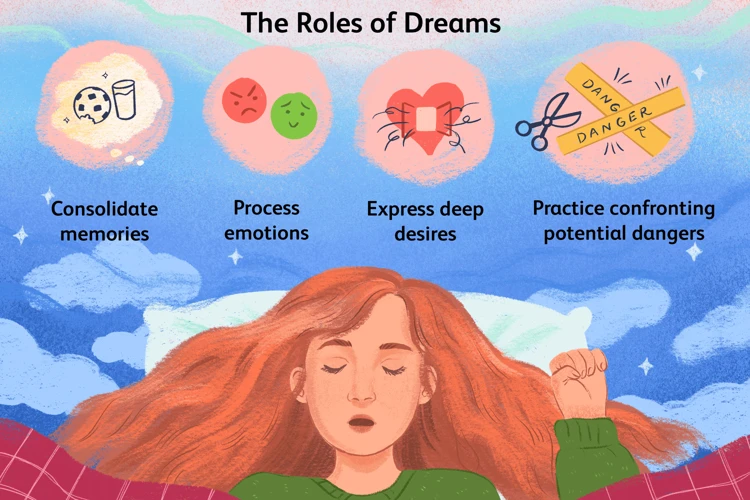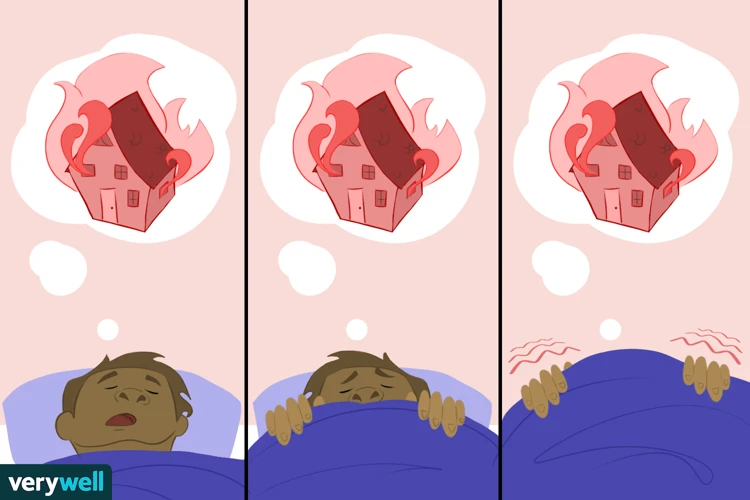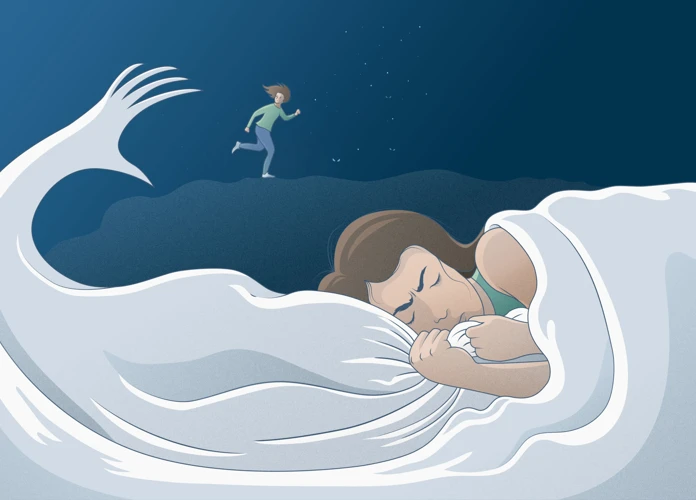Nightmares can be incredibly unsettling and disturbing experiences, even for adults. These vivid and often terrifying dreams can leave individuals feeling shaken and anxious, impacting their overall well-being and quality of life. Understanding the underlying psychological factors behind adult nightmares is crucial in order to find effective coping strategies and prevention techniques. In this article, we will explore the definition of nightmares, their prevalence among adults, and delve into potential psychological factors that contribute to their occurrence. Additionally, we will discuss the impact of adult nightmares on sleep quality and daily functioning, as well as provide strategies for coping with and preventing these distressing dreams. So, let’s dive into the world of adult nightmares and uncover the mysteries that lie beneath.
Understanding Adult Nightmares

Nightmares are intense and distressing dreams that can evoke feelings of fear, terror, and anxiety in adults. These dreams often involve vivid and detailed scenarios that may be riddled with dangerous situations, threats, or nightmarish creatures. The experience of adult nightmares can vary greatly, with some individuals having occasional nightmares while others suffer from recurrent nightmares. It is important to note that nightmares are different from other sleep-related disorders such as sleep paralysis or night terrors. Although nightmares typically occur during the REM (Rapid Eye Movement) stage of sleep, they can also take place during non-REM sleep. To better understand adult nightmares, it is essential to explore their definition and prevalence among adults. By gaining insight into the nature of nightmares, we can begin to unravel the underlying psychological factors that contribute to their occurrence.
1. Definition of Nightmares
A nightmare is defined as a vivid and distressing dream that often elicits intense feelings of fear, terror, and anxiety. These dreams are characterized by their ability to cause significant emotional distress and can often be remembered upon waking. Nightmares typically involve threatening or dangerous situations, which may include scenarios such as being chased, attacked, or trapped. The content of nightmares can vary based on individual experiences and fears. However, common themes include being unable to escape, encountering supernatural beings or monsters, or experiencing physical harm. It is important to note that nightmares are different from night terrors, which are characterized by sudden awakenings accompanied by intense fear and physical symptoms such as rapid heart rate and sweating. To gain a deeper understanding of the relationship between nightmares and sleep disorders, particularly sleep paralysis, you can refer to the article “Nightmares and Sleep Paralysis: Exploring the Connection.” Additionally, if you are interested in exploring the meanings behind common nightmares, you can check out our article on the “Top 10 Common Nightmares and Their Meanings.”
2. Prevalence among Adults
Adult nightmares are more common than one might think. Research has shown that approximately 50% of adults experience nightmares at least occasionally, with around 2-8% reporting frequent nightmares. The prevalence of nightmares can vary based on factors such as age, gender, and overall mental health. Studies have indicated that women tend to experience nightmares more frequently than men, and the likelihood of having nightmares decreases as individuals age. It is also important to note that nightmares can be a symptom of underlying sleep disorders, such as sleep apnea or insomnia. In fact, individuals with insomnia are more likely to experience nightmares compared to those without the disorder. Certain psychiatric conditions, such as post-traumatic stress disorder (PTSD) and anxiety disorders, have been linked to a higher prevalence of nightmares. Understanding the prevalence of nightmares among adults is crucial in order to address their impact on sleep quality and overall well-being. By exploring the relationship between nightmares and sleep disorders, we can gain a deeper understanding of the complex nature of these distressing dreams.
Potential Psychological Factors

Many psychological factors can contribute to the occurrence of adult nightmares. One significant factor is the experience of traumatic events. Individuals who have undergone traumatic experiences, such as accidents, abuse, or witnessing violence, may be more prone to experiencing nightmares as a result. These nightmares can be a manifestation of the emotional distress and lingering effects of trauma. Another factor that can contribute to adult nightmares is anxiety and stress. The pressures of daily life, work-related stress, relationship difficulties, or financial worries can all contribute to heightened levels of anxiety, which can in turn manifest in nightmares during sleep. Additionally, individuals who struggle with depression and other mental health conditions may be more susceptible to experiencing nightmares. Research has shown a clear link between depression and the occurrence of nightmares. Understanding these potential psychological factors is crucial in addressing and finding ways to manage adult nightmares effectively. By exploring the connection between nightmares and sleep disorders (learn more here), we can gain further insight into the complex relationship between psychological well-being and dream experiences.
1. Traumatic Experiences
Traumatic experiences play a significant role in the occurrence of adult nightmares. When individuals go through trauma, such as physical or sexual assault, accidents, natural disasters, or combat, it can leave a lasting impact on their mental and emotional well-being. These experiences may cause the brain to process and consolidate the traumatic memories during sleep, resulting in nightmares. The nightmares often reflect the distressing elements of the trauma, and individuals may relive the events or feel intense emotions related to the traumatic experience.
The effects of trauma on sleep and nightmares can be long-lasting, with some individuals experiencing nightmares years after the initial trauma. This is often seen in individuals with post-traumatic stress disorder (PTSD). The nightmares in PTSD can be particularly vivid and recurrent, causing significant distress and contributing to sleep disturbances.
It’s important to note that not everyone who has traumatic experiences will develop nightmares. Factors such as individual resilience, coping mechanisms, and the presence of support systems can influence the likelihood of experiencing nightmares. Additionally, the severity and frequency of nightmares may vary depending on the nature and intensity of the trauma.
To address nightmares stemming from traumatic experiences, therapy approaches such as cognitive-behavioral therapy (CBT) and eye movement desensitization and reprocessing (EMDR) have shown promising results. These therapies aim to help individuals process and cope with the traumatic memories, reducing the frequency and intensity of nightmares.
Understanding the connection between traumatic experiences and adult nightmares is crucial in providing appropriate support and interventions for individuals who are affected. By addressing the underlying psychological factors associated with traumatic experiences, individuals can work towards healing and finding relief from their distressing nightmares.
2. Anxiety and Stress
Anxiety and stress are two significant psychological factors that can contribute to the occurrence of nightmares in adults. When individuals are experiencing high levels of anxiety or stress, it can disrupt the normal sleep patterns and trigger the occurrence of nightmares. Anxiety, characterized by excessive worry and fear, can create a heightened state of arousal even during sleep, making individuals more susceptible to nightmares. Stress, on the other hand, can lead to intrusive thoughts and emotional turmoil, which can manifest in the form of nightmares during sleep. Research has shown that individuals who are dealing with chronic stress or have a diagnosed anxiety disorder are more likely to experience nightmares. The content of these nightmares often reflects the specific fears, worries, or traumas that are associated with the anxiety or stress. For instance, individuals who are anxious about a particular event or facing a challenging situation may have nightmares that revolve around failure, humiliation, or being chased. Similarly, individuals experiencing post-traumatic stress disorder (PTSD) may have nightmares that reenact the traumatic event. Understanding the role of anxiety and stress in the occurrence of nightmares can help individuals recognize the potential triggers and develop effective coping strategies to manage their anxiety and stress levels.
3. Depression and Mental Health
Depression and mental health issues can play a significant role in the occurrence and severity of adult nightmares. Individuals who struggle with depression often experience disrupted sleep patterns, which can increase the likelihood of nightmares. The negative emotions associated with depression, such as sadness, despair, and hopelessness, can surface in these dreams, intensifying the distress and emotional impact upon waking. Individuals with mental health disorders, such as anxiety disorders or post-traumatic stress disorder (PTSD), are also more prone to experiencing nightmares. These conditions can heighten stress levels, making individuals more susceptible to nightmares as a result. Nightmares may serve as a reflection of the emotional turmoil and internal struggles individuals face in their waking lives, making it crucial to address and manage underlying mental health concerns in order to alleviate the frequency and intensity of nightmares. Seeking therapy or counseling can be beneficial in developing coping strategies and improving overall mental well-being, thus reducing the impact of depression and mental health on adult nightmares.
Impact of Adult Nightmares

The impact of adult nightmares goes beyond the realms of sleep and can significantly affect an individual’s overall well-being. One of the primary areas affected by nightmares is sleep quality. People who experience frequent nightmares often have disrupted sleep patterns, leading to difficulty falling asleep and staying asleep throughout the night. This can result in chronic sleep deprivation and daytime fatigue. Additionally, the emotional intensity and distress associated with nightmares can linger even after waking up, causing feelings of anxiety, fear, and unease. This can make it challenging for individuals to relax and unwind during waking hours, impacting their overall mental and emotional well-being. Adult nightmares can also have implications for daily functioning and productivity. The emotional toll of nightmares can make it difficult to concentrate, focus, and perform everyday tasks effectively. The residual anxiety and stress from nightmares can spill over into daily life, potentially affecting relationships, work performance, and overall quality of life. It is crucial to recognize and address the impact of adult nightmares, as their effects can be far-reaching and limiting.
1. Sleep Quality and Wellbeing
One of the significant impacts of adult nightmares is on sleep quality and overall well-being. When individuals experience frequent nightmares, it can lead to disrupted sleep patterns and difficulties in falling asleep or staying asleep throughout the night. The vivid and alarming nature of nightmares can cause individuals to wake up abruptly, feeling startled and anxious. This interruption to sleep can result in feelings of fatigue, daytime sleepiness, and impaired cognitive functioning.
The emotional intensity of nightmares can leave individuals feeling distressed and emotionally drained upon waking. They may experience heightened levels of fear, anxiety, or sadness, which can linger throughout the day, affecting their mood and overall well-being. The combination of poor sleep quality and emotional distress can have a significant negative impact on mental health, making individuals more vulnerable to conditions such as anxiety disorders, depression, and increased stress levels.
It is essential to address and manage adult nightmares to improve sleep quality and promote overall well-being. By implementing effective coping strategies and prevention techniques, individuals can take control of their sleep and minimize the adverse effects of nightmares on their daily lives.
2. Daily Functioning and Productivity
Persistent adult nightmares can have a significant impact on daily functioning and productivity. The intrusive and distressing nature of these dreams can result in sleep deprivation and poor quality of sleep, leading to daytime fatigue and reduced cognitive functioning. A lack of restorative sleep can affect attention, concentration, and memory, making it difficult to perform well in daily tasks and responsibilities. Additionally, the emotional toll of nightmares can result in increased irritability, mood swings, and difficulty regulating emotions, further impairing overall functioning. Adults who experience frequent nightmares may also find themselves avoiding certain activities, places, or triggers associated with their dreams, impacting their ability to engage fully in social interactions or pursue personal goals. It is crucial to address and manage adult nightmares to restore optimal daily functioning and productivity.
Coping Strategies for Adult Nightmares

1. Nightmare Diary and Imagery Rehearsal Therapy: Keeping a nightmare diary can be a helpful strategy for managing adult nightmares. This involves recording details of the dream as soon as you wake up, including any emotions, visuals, or triggers that stood out. By actively engaging with the content of the nightmare, you can gain insights into potential underlying psychological factors and patterns. Another effective technique is imagery rehearsal therapy, where you rewrite the ending of the nightmare to create a more positive outcome. This can help desensitize the emotional response associated with the nightmare, making it less distressing and empowering you to take control of the dream narrative.
2. Relaxation Techniques and Mindfulness: Practicing relaxation techniques such as deep breathing, progressive muscle relaxation, or guided meditation can help calm the mind and alleviate anxiety associated with adult nightmares. These techniques promote relaxation and provide a sense of grounding, making it easier to fall back asleep after a nightmare. Additionally, incorporating mindfulness into your daily routine can help increase awareness of the present moment, reducing rumination and intrusive thoughts that might contribute to nightmares. By cultivating a state of mindfulness, you can create a sense of calmness and distance from the distressing dream content.
3. Seeking Professional Help: If adult nightmares significantly impact your daily functioning and quality of life, consider seeking professional help from a therapist or psychiatrist specializing in sleep disorders or trauma. Cognitive-behavioral therapy (CBT) and other evidence-based interventions can be effective in addressing the underlying psychological factors contributing to nightmares. A trained professional can help you develop personalized coping strategies, navigate unresolved traumas, and manage anxiety or stress that may be exacerbating the nightmares. Remember, seeking support is a sign of strength and can lead to significant improvement in your overall well-being.
Implementing these coping strategies for adult nightmares can empower you to regain control over your sleep and reduce the distress associated with these vivid dreams. By actively engaging with the content of nightmares, practicing relaxation techniques, and seeking professional help when needed, you can develop effective mechanisms for coping with and managing adult nightmares. Remember, everyone’s experience with nightmares is unique, so it may take time and patience to find the strategies that work best for you.
1. Nightmare Diary and Imagery Rehearsal Therapy
One effective coping strategy for adult nightmares is the use of a nightmare diary and imagery rehearsal therapy. Keeping a nightmare diary involves recording details of the nightmares immediately upon waking up, including the content, emotions, and any potential triggers or themes. This process helps individuals identify patterns and triggers that may be causing or exacerbating their nightmares. By becoming more aware of these patterns, individuals can start to develop strategies to address them.
Imagery rehearsal therapy (IRT) is another technique that can be used in conjunction with a nightmare diary. In IRT, individuals rewrite the ending or change the content of their nightmares to create a more positive outcome. Through repeated rehearsal of this new imagery, often during the waking hours, individuals can alleviate the fear associated with the nightmare and potentially alter its recurring nature. Both the nightmare diary and imagery rehearsal therapy aim to provide a sense of control and empowerment over one’s dreams, ultimately reducing the frequency and intensity of nightmares.
Using these techniques can be a powerful way to manage and cope with adult nightmares, allowing individuals to regain control over their sleep and alleviate the distressing impact of nightmares on their daily lives.
2. Relaxation Techniques and Mindfulness
Relaxation techniques and mindfulness practices have been found to be helpful in managing adult nightmares. When individuals experience high levels of stress and anxiety, it can increase the likelihood of nightmares occurring. Engaging in relaxation techniques, such as deep breathing exercises or progressive muscle relaxation, can help to calm the mind and body before sleep. This can create a more relaxed and peaceful state conducive to a better night’s sleep. Mindfulness practices, such as meditation or guided imagery, can also be effective in reducing anxiety and promoting a sense of mental well-being. By focusing on the present moment and cultivating an attitude of non-judgmental awareness, individuals can learn to let go of worries and intrusive thoughts that may contribute to nightmares. Additionally, practicing mindfulness during the day can help individuals develop greater self-awareness and emotional regulation, which can have a positive impact on their overall sleep quality. So, incorporating relaxation techniques and mindfulness into one’s daily routine can greatly contribute to reducing the frequency and intensity of adult nightmares.
3. Seeking Professional Help
Seeking professional help is an important step for individuals experiencing persistent and distressing adult nightmares. Consulting with a qualified mental health professional, such as a therapist or counselor, can provide valuable support and guidance in managing and overcoming nightmares. These professionals have the expertise to assess and identify the underlying psychological factors contributing to nightmares. They can also help individuals develop effective coping mechanisms to reduce the frequency and intensity of nightmares. Therapies such as Cognitive Behavioral Therapy (CBT) and Eye Movement Desensitization and Reprocessing (EMDR) have shown promising results in treating nightmares related to trauma or PTSD. Additionally, professionals can address any co-occurring mental health conditions like anxiety or depression that may be exacerbating nightmares. It is important to remember that seeking professional help is a sign of strength, and it can make a significant difference in improving sleep quality and overall well-being.
Prevention Techniques
Prevention Techniques for adult nightmares are crucial in reducing their frequency and intensity. Here are some effective strategies that can help individuals prevent nightmares:
1. Creating a Sleep-Friendly Environment: Establishing a soothing and comfortable sleep environment can contribute to a more peaceful sleep experience. This includes keeping the bedroom dark, cool, and quiet, as well as minimizing distractions such as electronic devices. Creating a consistent bedtime routine and ensuring a comfortable mattress and pillows can also promote better sleep quality.
2. Stress Reduction and Self-Care: High levels of stress and anxiety can contribute to the occurrence of nightmares. Engaging in stress reduction techniques such as exercise, relaxation exercises, and deep breathing can help alleviate anxiety before bedtime. Incorporating self-care practices into daily routines, such as practicing mindfulness, engaging in hobbies, or journaling, can also promote emotional well-being and reduce the likelihood of nightmares.
3. Seeking Professional Help: If nightmares persist and significantly impact daily life, it may be beneficial to seek professional help. A therapist or counselor experienced in dream analysis and sleep disorders can provide valuable insights and recommend appropriate treatment options. Techniques such as Cognitive Behavioral Therapy (CBT) or imagery rehearsal therapy may be utilized to address underlying psychological factors contributing to nightmares.
By implementing these prevention techniques, individuals can take proactive steps towards reducing and preventing adult nightmares. It is important to remember that each person’s experience with nightmares is unique, and finding the approaches that work best for individual needs is key.
1. Creating a Sleep-Friendly Environment
Creating a sleep-friendly environment is essential in preventing adult nightmares and promoting restful sleep. One key aspect of this is optimizing the bedroom for sleep. The room should be cool, dark, and quiet, as these conditions facilitate better sleep quality. Use blackout curtains or an eye mask to block out any unwanted light, and invest in earplugs or a white noise machine to mask any disruptive sounds. It is also important to have a comfortable mattress and pillows that provide adequate support for the body. Additionally, incorporating a relaxing bedtime routine can signal to the body and mind that it is time to sleep. This may include activities such as reading a book, taking a warm bath, or practicing relaxation techniques like deep breathing or meditation. By creating a sleep-friendly environment, you can improve your chances of having peaceful and undisturbed sleep, minimizing the likelihood of experiencing distressing nightmares.
2. Stress Reduction and Self-Care
Effective stress reduction and self-care practices can play a crucial role in managing adult nightmares and promoting better sleep. Here are some strategies to consider:
1. Relaxation Techniques: Engaging in relaxation techniques can help calm the mind and body before bedtime, reducing stress levels that can contribute to nightmares. Deep breathing exercises, progressive muscle relaxation, and guided imagery are relaxation techniques that can promote a sense of calm and relaxation.
2. Mindfulness: Practicing mindfulness involves focusing on the present moment and accepting thoughts and emotions without judgment. This can help reduce stress and anxiety that may trigger nightmares. Mindfulness techniques such as meditation, yoga, or tai chi can promote a sense of peace and improve overall well-being.
3. Self-Care Routine: Implementing a consistent self-care routine can have a positive impact on stress levels and improve sleep quality. This may include activities such as taking warm baths, reading a book, listening to calming music, or engaging in hobbies that bring joy and relaxation.
4. Healthy Lifestyle: Maintaining a healthy lifestyle can contribute to stress reduction and better sleep. This involves practicing good sleep hygiene by establishing a regular sleep schedule, creating a comfortable sleep environment, and limiting exposure to electronic devices before bedtime. Additionally, incorporating regular exercise, eating a balanced diet, and avoiding excessive caffeine and alcohol can all contribute to overall well-being and better sleep quality.
Remember, it is important to identify and address the underlying causes of stress and actively engage in activities and practices that promote relaxation and self-care. By reducing stress and prioritizing self-care, individuals can improve their overall well-being and potentially minimize the occurrence of adult nightmares.
Conclusion
In conclusion, adult nightmares can have a significant impact on an individual’s overall well-being and quality of life. Understanding the underlying psychological factors that contribute to the occurrence of nightmares is essential in order to develop effective coping strategies and prevention techniques. Traumatic experiences, anxiety and stress, and depression are common psychological factors that may contribute to adult nightmares. These distressing dreams can negatively affect sleep quality, daily functioning, and productivity. However, there are coping strategies available, such as keeping a nightmare diary and utilizing imagery rehearsal therapy, practicing relaxation techniques and mindfulness, and seeking professional help when necessary. Additionally, creating a sleep-friendly environment and engaging in stress reduction and self-care practices can help prevent the occurrence of adult nightmares. By implementing these strategies, individuals can take steps towards minimizing the impact of nightmares on their lives and promoting better sleep and overall well-being.
Frequently Asked Questions
1. Can nightmares be a sign of a underlying sleep disorder?
Yes, nightmares can be a symptom of certain sleep disorders, such as sleep apnea or REM sleep behavior disorder. It’s important to consult with a healthcare professional to determine the underlying cause of your nightmares.
2. Are nightmares more common during certain stages of life?
Yes, nightmares are more common in childhood, but they can still occur in adulthood. The themes and frequency of nightmares may change with age, but they can still be distressing and impact overall well-being.
3. Is there a connection between nightmares and trauma?
Yes, nightmares can be associated with past traumatic experiences. Trauma-related nightmares can serve as a way for the mind to process and cope with the emotional distress caused by traumatic events.
4. Can medications or substances cause nightmares?
Yes, certain medications, including antidepressants and blood pressure medications, as well as substances like alcohol and illicit drugs, can potentially trigger nightmares as a side effect.
5. Can anxiety and stress contribute to the occurrence of nightmares?
Absolutely. High levels of anxiety and stress can disrupt sleep patterns, leading to an increased likelihood of nightmares. It’s important to address and manage stress and anxiety to reduce the frequency of nightmares.
6. Are nightmares a symptom of mental health conditions?
Nightmares can be connected to mental health conditions such as depression, post-traumatic stress disorder (PTSD), and anxiety disorders. Treating and managing these underlying conditions can help alleviate nightmares.
7. How can nightmares affect an individual’s sleep quality?
Nightmares can lead to interrupted sleep, difficulty falling back asleep, and overall poor sleep quality. This can result in daytime fatigue, irritability, and decreased functioning.
8. Can recurring nightmares lead to psychological distress?
Yes, recurring nightmares can cause significant psychological distress, leading to heightened anxiety, fear of sleep, and a negative impact on overall well-being. Seeking professional help may be necessary in managing recurrent nightmares.
9. Are there any natural techniques to cope with nightmares?
Yes, techniques such as keeping a nightmare diary, practicing imagery rehearsal therapy, and relaxation techniques like deep breathing and mindfulness can be effective in coping with nightmares.
10. Can creating a sleep-friendly environment help prevent nightmares?
Absolutely. Creating a calm and comfortable sleep environment, maintaining a consistent sleep schedule, and practicing good sleep hygiene can contribute to better sleep quality and potentially reduce the occurrence of nightmares.








